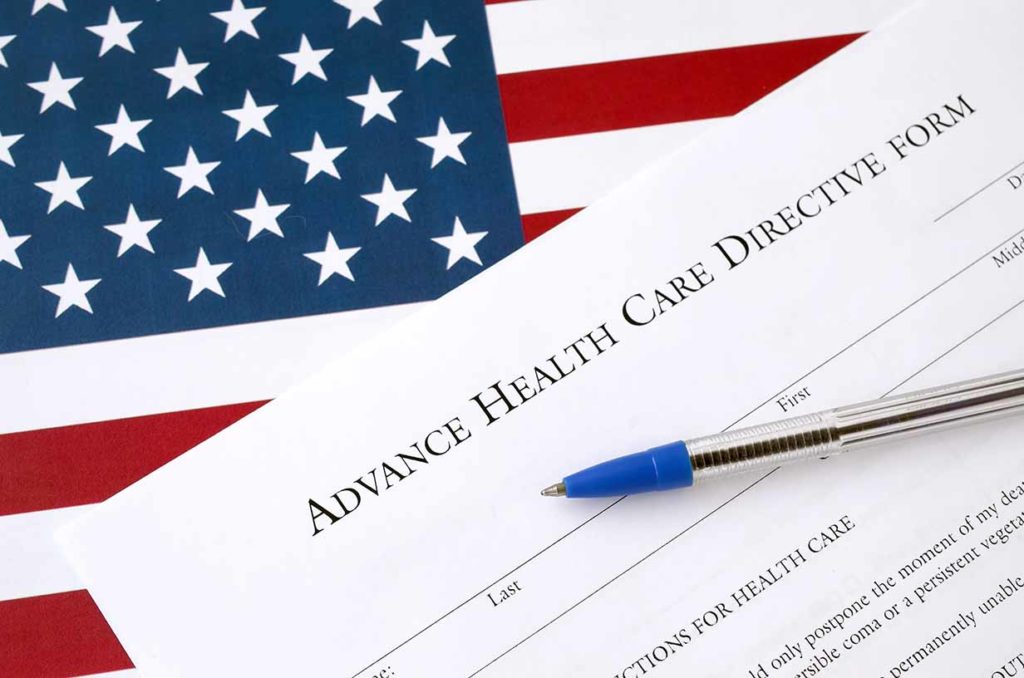Advance Directives – The Basics
An advance directive is simply a document done in the present to guide decisions in the future. Their roots lie in how a business person would assign a right to another to act on their behalf as their agent. These agency agreements came to be known as Power of Attorneys (POAs). In the area of health care, they are known as Medical POAs.
Medical POAs are problematic because they give your the right to determine your health care to another person. In America, the courts have recognized self-determination as a fundamental right. A Medical POA stands in direct conflict with that right.

Advance Directives & Self-Determination
The basic issue was simple. A Power of Attorney describes how another person can act for you. Most issues POAs address are related to decisions over money and property. Areas that are not matters of life and death. When life and death issues are involved, a POA brushes up with Supreme Court recognized rights of self-determination.
POAs that focus on medical issues are called Medical Powers of Attorneys. Advance directives that focus on medical issues are called Advance Medical Directives.
Why Advance Directives & Medical POAs Are Complicated?
The issue gets complicated quickly. Here’s a way to think about the complication. If I wave a POA to sell your products and I have somehow misrepresented or abused that POA, I (the POA maker), you (my agent using the POA), and the third party relying on POA can litigate the issue and reach a resolution.
However, what happens if Dave has Jack’s Medical Power of Attorney and he presents it to a hospital and says, “don’t perform any medical services.” Jack’s three children say to the hospital, “perform every possible procedure to keep Dad alive.” The hospital says we have to act in the next day or two to preserve Jack’s life and wants to know what Jack wants. Dave says one thing, his three children another. If Jack executed an Advanced Medical Directive, it would describe his medical wants. Without it, the hospital is trying to interpret wants through a medical POA and the desires of Jack’s three children.
The scenario shows how without it, the medical providers are placed in a difficult position. This describes the problem.
How Governments Try To To Uncomplicate End of Life Medical Decisions
States recognized these issues and created state laws pushing Advance Medical Directives as alternatives to Living Wills. Ultimately, the federal government developed legislation on Advance Medical Directives, as a kind of easy legislative way for executing a legal document as an alternative to a Living Will. Congress passed the 1990 Patient Self-Determination Act (PSDA). The legislation attempts to ensure patients are provided information about advance directives so they can communicate to medical providers what treatments they want and don’t want.
In short, making an Advance Medical Directive communicates my medical treatment wishes when I am incapacitated. It adds information to any Medical POA I might have. It also alleviated the anxiety medical professionals may have in denying or withdrawing medical treatments. Finally, it helps convey your wishes to other family members, so they are less likely to fight over what you want.
Iterations of Advance Directives
You’re likely to hear talk of one or more of the following: Advanced Care Medical Directives, Living Wills, Community DNRs, Physician Orders for Life-Sustaining Treatment, Five Wishes, and Medical Power of Attorneys. Many do the same or similar things, others are unique.
CarePlanIt covers all of these in detail. See our Section on Introduction To Advanced Directives & Living Wills and in particular our summary on Advance Directive Documents.
CarePlanIt’s Approach
CarePlanIt’s Approach CarePlanIt classifies every issue into one of five key areas: health, housing, finances, end-of-life chores & family communication. Once done, the CarePlanIt framework allows you to create an optimized process of addressing the challenge. You minimize your family’s time and costs while maximizing your chance at reaching an ideal solution. Although all five categories work together, it’s important to make an initial categorization.

Advance Medical Directives (AMDs) are an “End-of Life” chore. Without doing your “End-of-Life” chores your spouse and family simply don’t know how to manage your wishes and affairs. It’s like not picking up your eight-year-old from school and expecting them to get home, make dinner and pay the bills.
For a detailed way to approach these challenges, see our End of Life Chores Section.
Quick Ideas
> Visit your states living will website (all states have them). Type in to a search engine [ (your state) and (advance directive) ]/ Here’s a link to a Califonia form.
> See Five Wishes website – their advance medical directive is recognized in almost every state
> If you trust someone explicitly and want them to make all your decisions when you can’t, and even when you can, look for General Power of Attorney and follow the requirements for proper execution.